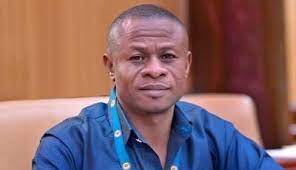Adeola Odeku Street in an upmarket Lagos neighborhood boasts the highest concentration of bank branches in Nigeria — but when people need cash they turn to mobile money agents under patchy umbrellas clutching palm-sized point-of-sale devices, rather than the lenders.
“My business is to give you the money if you can’t get it there,” Sani Abdulrahman said, pointing from his wheelchair to a branch of the United Bank for Africa — Nigeria’s third largest bank by market value — across the street, and its block of empty ATMs.
Abdulrahman is one of more than two million mobile agents operating across Nigeria — one for every 100 people — handling most of the country’s daily transactions and starving the formal banking system of cash. The Central Bank of Nigeria, looking to increase financial inclusion, encouraged their proliferation. But regulators now fear they are consuming the monetary system, undermining the fight against inflation and pushing the naira further from their control.
“Having excess cash outside the banking system would render impotent policy issues on the cash reserve ratio and lending rate,” said Ijeoma Kalu, professor of economics at the University of Port Harcourt. That’s why the bank’s current tightening cycle — it has raised interest rates to 27.5% to fight inflation that hit 33.9% in October — isn’t working, he added.
Roughly 93% of total currency in circulation — or 4 trillion naira ($2.6 billion) — sits outside of banks as of September, according to central bank data. That’s up from 81% in September 2019.
“All that cash that would have come into the system for us to process and re-issue, are being held by these POS operators — we discovered it and we are working on it,” said Olayemi Solaja, the CBN’s acting director of currency operations. Still, he said regulators were treading gently because “we can’t jeopardize our financial inclusion advocacy.”
At a gas station in the capital, Abuja, Fortune Ifetayo clutches a fake Gucci bag heavy with wads of naira smeared with gasoline — a fresh haul from many agents’ favorite kind of client: cash-heavy businesses that would otherwise deposit their money in banks.
“We carry the cash in bits of 100,000 to 500,000, sometimes I personally come here twice daily,” said Ifetayo. It’s a win-win: the agents get cash, and businesses get money in their accounts while selling their cash at a higher fee than bank deposit rates.
It’s an unintended consequence of the central bank’s decision to create the agency system in 2016: The agents, buying naira from market stalls and gas stations, have effectively become competitors to the banks rather than conduits that bring people into the financial system.
Despite huge leaps in financial technology across Africa, nearly half of Nigerian adults didn’t make payments through regulated financial operators in 2023, according to Enhancing Financial Innovation & Access, a development organization that tracks the data. At the same time, Nigeria has too few ATMs — just 14 per 100,000 adults, compared to 31 in Egypt, according to the IMF — which are in any case often empty.
That’s where the agents, ubiquitous on street corners selling mobile data charge cards and electricity top-ups, come in. There are now roughly 1,600 of them within every square kilometer, according to the IMF.
The surge has been driven by an army of young people seeking jobs and the rise of financial technology companies like Opay, Paga and Moniepoint, that provide affordable terminals. Now the central bank is trying to crack down on agents ahead of the holiday season, when demand soars and they raise their fees.
In a Dec. 3 circular, it threatened to sanction banks if they don’t fill their ATMs. Solaja also said it’s providing 1.5 billion naira to banks in Lagos each week: “We have opened our gates.”
But four branch managers in Lagos and the oil hub Port Harcourt, speaking anonymously as they don’t have approval to speak for their employers, said their vaults are bare.
One manager estimates his seven ATMs need 15 million naira daily while he only gets 10 million a week from the central bank. Lenders have large vaults to handle the cashflow that comes with a note-heavy economy, but those are now mostly empty. The manager said that where his branch once held 100 million naira daily, it now carries less than five million naira.
Mustafa Chike-Obi, chairman of the Bank Directors Association of Nigeria, said the problem was “more seasonal than anything else. And if it is, we will make higher demands and I expect that the CBN will meet the higher demand.”
Agents say they provide a valuable service in a country where 28 million adults lack access to financial services and 93% work in the informal, cash-centric, economy.
“One of the biggest challenges to financial inclusion is access, and we bridge that gap,” said Obioha Oti, who resigned as a branch manager at FBN Holdings Plc to set up a national web of agents. Nearly half of Nigeria’s municipalities lack banks, he added.
Attitudes toward cash have also been reinforced by experience. Many Nigerians are still scarred from a botched currency redesign two years ago which caused a nationwide naira scarcity that still persists. Technological hiccups means bank transfers sometimes take days.
The low barrier of entry for becoming an agent — a sturdy umbrella, a heavy-traffic location, a POS terminal and a cash wad of 20,000 naira — has also kept Nigeria’s many unemployed young people busy.
“The other option is to stay at home,” said 22-year-old university graduate Frederick Owunebe, sitting at a table in the Wuse area of Abuja, where she makes around 200,000 naira monthly in profits — almost three times Nigeria’s minimum wage. Opposite her, the ATM at a commercial bank was glazed in dust, and a poster that read ‘Out of Service” fluttered gently.
Disclaimer: Ahotoronline.com is not liable for any damages resulting from the use of this information
Source: Bloomberg




